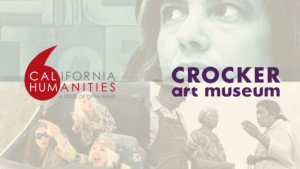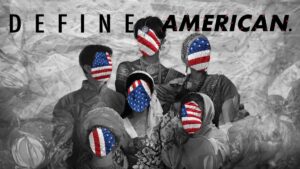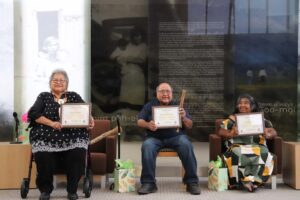Projects Supported by the Humanities for All Project Grant
June 25, 2021
For Immediate Release
Media Contact: Cherie Hill, Communications Manager, chill@calhum.org
Image / Unidad Park Mural Tour
(Oakland, CA) —California Humanities is proud to announce ten new Humanities for All Project Grant awards totaling $175K to support ambitious and innovative public humanities programs across the state during the next two years. The new grantees represent a broad range of California-based nonprofit organizations and public agencies, including regional museums, community cultural organizations, public higher educational institutions, and local historical societies.
These projects will bring the humanities to bear on topics and issues of current importance to Californians, including the preservation of indigenous cultures, making local history more visible and accessible, raising awareness and appreciation of the work of California artists, thinkers, and writers, and exploring the legacy of social justice movements. All projects will promote intercultural and intergeneration understanding, and reach new and underserved audiences through engaging activities accessible to people of all ages and backgrounds.
The California Humanities’ Project Grant program, a branch of our Humanities for All competitive grant program, offers funding (between $10k and $20k) awarded twice a year for larger public humanities projects of up to two years duration from the award date. Launched in 2017, the program has made over 100 awards to organizations across the state, totaling close to $2 million.
“We are thrilled to see how cultural organizations and public agencies are striving to meet the needs of their communities and to address pressing social issues with the tools the humanities give us,” states President and CEO Julie Fry. “Many of these projects will reach audiences and communities that have limited opportunities to participate in public humanities programming.”
Projects Awarded Spring 2021
Note: In this round of Humanities for All Project Grant awards, California Humanities designated specific funding for the area of Youth Voices. These projects involve teens as primary program participants or audiences and address topics or subjects of interest to them (denoted by “*”).
Oakland Stories: Elders in Social Justice*
Stagebridge, Oakland
Project Director: Clara Kamunde
With guidance from Dorothy Lazard, a head librarian in the Oakland Public Library’s History Center, members of Stagebridge’s cadre of elderly storytellers will research and create new works exploring Oakland’s history. The project will focus on developing stories related to the project’s central theme of social justice and present a live online performance of these stories followed by audience discussion. A project website will house a recording of the performance and historical materials compiled by Ms. Lazard and the elders. Using performance to share knowledge and cultural traditions, the project will forge connections among audience members of different backgrounds and generations and deepen their understanding of their city’s rich history and the state.
Textures of Remembrance: Vietnamese Artists and Writers Reflect on the Vietnamese Diaspora
Exhibit Envoy Inc, San Francisco
Project Director: Amy Cohen
Focusing exclusively on stories and memories from Vietnamese American writers and artists, “Textures of Remembrance” will create a space within California’s cultural fabric that includes, recognizes, and elevates the contributions of diasporic Vietnamese voices. Activities include a traveling exhibition, an online exhibition, and a series of public programs developed in partnership with the Diasporic Vietnamese Artists Network and the Oakland Asian Cultural Center. The exhibition will premiere in Summer 2022 before traveling to locations around the state. The project aims to present a humanities-driven exploration of the impact of the Vietnam War, collect and share stories in the diasporic Vietnamese community to foster healing and connection, build intergenerational and cross-cultural understanding, and counter stereotypes of and racism towards Vietnamese Americans and refugees.
Voces de las Abuelas: Mexican and Mexican-American Women’s Oral History Project
University of Southern CA, Los Angeles for LA Plaza de Cultura y Artes Foundation
Project Director: Sarah Portnoy
Conducted in collaboration with LA Plaza de Artes y Cultura, Voces de las Abuelas aims to create communities and cultures unique to Southern California. The project amplifies the voices of indigenous, Mexican, and Mexican American abuelitas (grandmothers) who have cooked, preserved, and passed on Mexican and Mexican American cuisine. Voces de las Abuelas reveals the relationship of these women to Mexican cuisine, Los Angeles, and its Latinx communities through recording and sharing their stories and family recipes, interviews, cooking demonstrations, a multimedia exhibit, a short video, and a website. Documenting these histories and family recipes will enrich understandings of the contributions of Mexican and Mexican American women to Southern California culture and enable visitors and audiences to appreciate and even cook these traditional foods. In addition, the project helps preserve Mexico’s diverse culinary traditions in the face of hardship, modernization, and forced displacement.
Xicana[x] Indigenous Values: Encuentros, Convenings, and Conversations
Regents of the University of California at Santa Barbara for Las Maestras Center for Xicana(x) Indigenous Thought Art and Social Practice
Project Director: Celia Herrera Rodriguez
Las Maestras Center for Xicana[x] Indigenous Thought, Art and Social Practice at UC Santa Barbara (LMC) will host Xicana[x] Indigenous Values: Encuentros, Convenings, and Conversations, an intra/intercultural exploration of Xicana[x], Latinx and Indigenous ancestral and relational knowledge and living ethical practices. This multifaceted community conversation will be live-streamed and open to the public at UC Santa Barbara, CSU Channel Islands, and within community centers in the Central Coast region of CA. LMC will facilitate a series of intergenerational discussions, performances, and explorations of questions pertinent to Xicana[x] Indigenous consciousness, including values and their implementation of daily practice. Conversations will occur amidst artists, activists, students, and academics whose political consciousness was shaped during the great waves of activism for Native, Xicanx, and Latinx Americans in North and Central America in the latter part of the twentieth century.
The Re-mapping Project: Listening to California’s Land: Indigenous—Community Dialogues on Place
Earth Island Institute Inc, Berkeley for California Institute for Community Art & Nature
Project Director: Malcolm Margolin
Guided by a committee of Native people, linguists, historians, geographers, and other humanities experts, this project aims to restore Indigenous California place names to the human imagination as a fierce rejection of colonialism and an embracing of beauty and connection to the deeper history of the land in which we live. Twelve public discussion events in locations across the state will engage local Indigenous culture bearers and non-Indigenous community members in exploring the meaning and understanding of place, as seen through Indigenous cultural lenses. Focusing on place as an entry into Native California – understanding land history, stories, living culture, and how it has been erased and harmed by colonization and genocide – will serve as a potent opportunity to protect Native cultures and educate the broader public about their existence and importance.
Rajkamal Kahlon: And Still I Rise
University Enterprises Inc dba Sacramento State Sponsored Research
Project Director: Kelly Lindner
The University Library Gallery at Sacramento State will present an exhibition with related public programs featuring the work of South Asian American artist Rajkamal Kahlon, a locally-born artist who has achieved international recognition. Painting directly atop disassembled book pages from anthropology books, medical reports, travel books, and other materials, Kahlon proposes painting as a strategy to reframe xenophobic narratives. Her work “talks back to these archival documents and points us towards spaces of potentiality and freedom.” The project includes a comprehensive interpretive exhibition, a display of artwork at Yuba Sutter Arts, Marysville, and five public programs on the Sacramento State campus and in the surrounding region occurring in fall 2021.
Chinatown History Project
Huntington-USC Institute on California and the West, Los Angeles
Project Director: William Deverell Ph.D.
This multifaceted project recovers the history of a place and a population. In the 1930s, the first Chinatown of Los Angeles was demolished to make way for Union Station. The residents and workers in this vibrant neighborhood lost their homes and places of employment. Working from a set of nearly 150 photographs that captured Chinatown before the bulldozers arrived, the Chinatown History Project reconstructs the neighborhood and its people through compilation of historical data: names, addresses, occupation, family data, citizenship information, photographs, oral histories, sources, even the demolition records issued to tear it all down. Walking tours, a book, a conference, lectures across formats and venues, an interactive website, and an augmented reality installation atop the former sites of homes, apartments, and stores will bring this little-known story to broad audiences. This project asks audiences (across Los Angeles and beyond) to expand our knowledge of this hidden history. It uncovers another troubled moment in the long history of racial oppression in the City of Angels.
Collidoscope: A De la Torre Brothers Retro-Perspective
Riverside Art Museum, Riverside
Project Director: Todd Wingate
“Collidoscope: A De la Torre Brothers Retro-Perspective” will inaugurate the new Cheech Marin Center for Chicano Art and Culture of the Riverside Art Museum, affectionately nicknamed “The Cheech.” Opening in December 2021, the exhibit, developed in partnership with the Smithsonian Latino Center, will examine the work of two artists whose work crosses the borders of nationality and culture (Mexican and American), media (glassblowing and printmaking), and influences (folk art, technology, and popular culture). In addition, the project will further explore the themes of border and identity in related publications, offer a robust series of public programs, and an artist residency, providing visitors and viewers in the Inland Empire and beyond with opportunities to develop greater appreciation and understanding of the evolving culture of the border region.
Literature Of and About the Dunes & the Central Coast
Guadalupe-Nipomo Dunes Center, Guadalupe
Project Director: Alexis Elias
Through a year-long series built around four books by local writers set in the local landscape, this project aims to increase familiarity with the history, geography, and narratives of the Dunes and the Central Coast. The selected works will be made available in both Spanish and English. In addition, local public libraries will host discussions in both languages, facilitated by humanities experts from Cal Poly SLO and UC Santa Barbara. Project activities will culminate with three public programs that explore the themes of the works, provide an opportunity for the readers to share what they have discovered, promote a deeper understanding of the relationship of literature and place, and encourage self-interrogation and empathy among all participants.
Jakara: Sikh Youth Public History Project*
Fresno City & County Historical Society
Project Director: Candice Pendergrass
By enabling youth to become the collectors and curators of their personal and family histories, a series of educational workshops and intergenerational public history projects will record, preserve, and make the little-known history of the Sikh and South Asian communities in Fresno County more visible. A cohort of 15 to 25 teen participants will acquire skills in family history research, oral history collection, digitization, and exhibit design while developing a deeper understanding of the international context of their family history. Video oral histories and digitize family photographs and documents will be incorporated into digital exhibits and shared via presentations and Google Arts & Culture. A cumulative community listening event will provide the public with the opportunity to view the young peoples’ work, and all project-produced materials will be saved and shared through the physical and online archives of the Historical Society.
Learn more about the Humanities for All Grant Program here.
About California Humanities:
California Humanities, a nonprofit partner of the National Endowment for the Humanities, promotes the humanities—focused on ideas, conversation and learning—as relevant, meaningful ways to understand the human condition and connect people to each other in order to help strengthen California. California Humanities has provided grants and programs across the state since 1975. To learn more, visit calhum.org, or like and follow on Facebook, Twitter, and Instagram.
###




